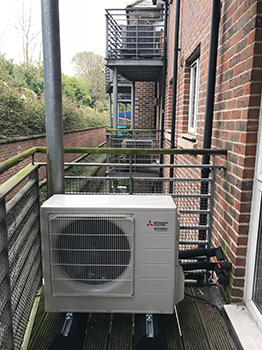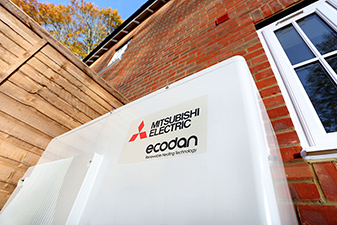The heating ( r)evolution

Times are changing for the heating sector. Russell Dean maps out the route from harmful fossil fuels to clean energy.
Evolution is the incremental process of change over extended periods of time. It doesn’t leap forward in great bounds but slowly changes the process and outcome. This goes for any process or industry going through a change and growth. Reliant for so long on coal, oil and gas, we are now in a period of change, moving from harmful fossil fuels to renewable, clean energy.
The car is a perfect example of this. It has moved from steam, to petrol, to diesel and we are now straddling the point between hybrid and fully electric vehicles. While there are cars powered solely on electricity, they are in the minority and the infrastructure in place to support them is not the same as the one supporting the internal combustion engine. But the infrastructure supporting the conventional car has taken over a hundred years to develop so there shouldn’t be the expectation that overnight, we will make a giant leap forward to having the infrastructure to support the electric or hydrogen car – even if it is needed in a shorter timeframe.
The same rules that apply to the evolution of the car industry, apply to those of the heating industry. Traditional gas, oil and LPG heating systems are making way for those powered by electricity. For the government to meet binding renewable targets, the UK needs to rethink the way homes are heated. Heating in UK buildings accounts for a fifth of UK greenhouse gas emissions. The country needs to adopt a range of low carbon solutions to reduce the emissions resulting from heating. Currently, only around 4.5% of heat in buildings comes from low-carbon sources.
Traditional heating manufacturers are slowly realising that they are on the long end of a losing battle. These organisations are already looking towards the development of sustainable business models that will outlive the end of fossil fuels. Renewables are the clear way forward, both from a business perspective, and an environmental standpoint. With the UK importing 47% of the gas used in 2017 from Europe and Norway and the country needing to import even more as our own gas reserves deplete, surely the better approach is to focus on the energy we can generate on our own island through renewables, rather than being energy-dependent on other countries. We have already seen a greening of electricity production and this makes the case for electric heating even stronger.
One of the most effective and efficient ways of electric heating for homes is through the use of heat pumps. In the UK though, heat pumps, are still an underused solution, making up under 1% of annual heating system sales. The Committee on Climate Change is pointing to the installation of one million heat pumps a year by 2030 to help the UK meet its carbon reduction commitments.
 |
| A domestic air source heat pump in position |
Ground source or air source?
Heat pumps can be used to extract heat from water, the ground or the outdoor air. Ground Source Heat Pumps (GSHP) harvest heat using a deep drilled borehole or a series of shallow trenches. By circulating water and refrigerant through ground loops, the system absorbs the underground heat and upgrades it into usable heat for the building through a heat exchanger.
An Air Source Heat Pump (ASHP), extracts the heat directly from the outside air, upgrades it in a similar way to a GSHP and then distributes this usable heat to the homes heating and hot water systems. ASHP have a significant advantage over GSHP where space becomes a limiting factor as ground alternatives require extensive digging. ASHP’s can be readily fitted to an external wall, minimising surrounding disruption and installation costs.
The design and installation of ASHPs is also ideal for those in residential areas. They are suitable for almost any property and are able to work alongside existing heating systems in a hybrid situation if required, removing the need for an expensive re-fit. The ultra-quiet operation of a modern ASHP provides the additional benefit of flexibility in where they can be positioned, adhering to planning regulations while still ensuring no disturbance to homeowner or neighbour. As our urban communities become denser and more populated, ultra-quiet heat pumps are expected to become the common solution.
Going green
According to Government figures, heating and cooling currently accounts for nearly half of UK energy consumption, with around 50% of UK emissions from heating associated with space heating and hot water in domestic buildings. While it is all well and good the general public backing Government efforts to cut carbon emissions, when it comes to individual efforts, the financial cost of going green is often a major blocker to the adoption of renewable technologies.
The upfront cost of installing a heat pump is still more than the cost of installing a traditional gas boiler but comparable to an oil installation, whilst offering much lower running costs.
In addition, the Government’s Renewable Heat Incentive (RHI) scheme can offset the original upfront cost. Whilst the Government is considering changes to the RHI scheme, it will still apply for at least two more years and offers 7 years of quarterly payments to those with renewable heat systems in their properties.
Utility bills can also be reduced through the use of renewable energy sources. The Committee on Climate Change recognise that heat pumps could meet up to 75% of the total residential heat demand in the UK. This amounts to a staggering number of homes that could be using truly clean, low carbon, renewable energy.
 |
Heating (r)evolution
It isn’t hard to understand why uptake of ASHPs is so strong across Europe, with their ability to offer a reduction in running costs and emissions, increased efficiencies, easier maintenance and a pathway to a cleaner future.
In the UK, most growth has come from housing associations in particular, as they provide an easy way for households to save money on bills. For off-gas grid homes, ASHPs offer a welcome alternative to costly fuel delivery and storage and are helping combat fuel poverty.
Whilst heat pump sales are still dwarfed by gas boilers, the impetus for change is growing and ultimately, heat pumps will become the new norm in homes across the country. With Sweden, Austria, Germany and Switzerland leading the way in Europe, it won’t be long before the UK joins the list.
Those in the industry are in the midst of an exciting and challenging opportunity – as efficiency demands across all sectors become greater, ASHPs have an ever-increasing role to play in heating domestic spaces. With the UK government forecasting the sale of one million heat pumps a year by 2030, is it better to be ahead of the curve or following the crowd?
Russell Dean is head of Residential Heating & Ventilation for Mitsubishi Electric







